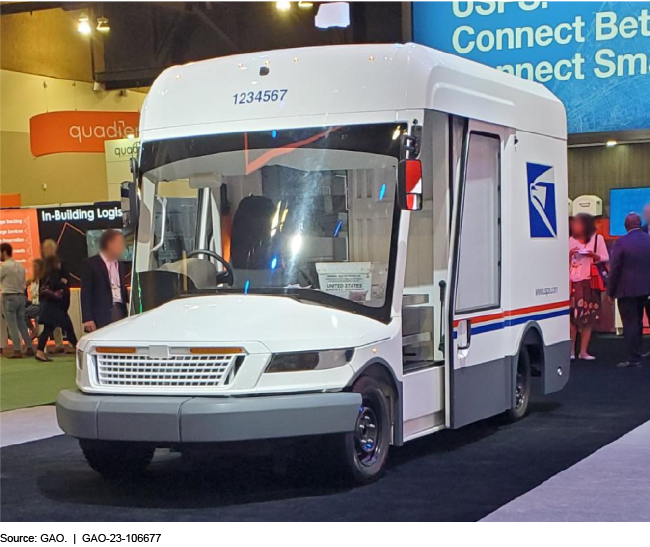U.S. Postal Service: Action Needed to Improve Credibility of Cost Assumptions for Next Generation Delivery Vehicles
Fast Facts
USPS is replacing its fleet of 200,000 delivery vehicles. Its new vehicles will include features like air bags, collision sensors, and an electric vehicle option.
USPS analyzed different factors, like fuel costs, to determine what proportion of gas and electric vehicles to purchase. In March 2022, USPS used a gas price of $2.71 in its analysis when actual gas prices were higher—affecting the decision to buy mostly gas vehicles. If USPS had used the prevailing price in its analysis, it would have suggested a purchase of mostly electric vehicles.
We recommended that USPS better explain its decision-making when purchasing these vehicles.
U.S. Postal Service's Next Generation Delivery Vehicle

Highlights
What GAO Found
The United States Postal Service's (USPS) cost estimate for acquiring the next generation delivery vehicle followed most leading practices for a comprehensive, well documented, and accurate estimate. However, USPS did not fully use practices related to credibility from GAO's Cost Estimating and Assessment Guide, such as including a sensitivity analysis of how different assumptions affected the underlying cost estimate. USPS officials said they use internal policies and are not subject to the Cost Guide. However, this guide reflects leading practices used by government and industry. Using these practices can strengthen the estimate's credibility and ensure effective cost management.
GAO's analysis of the purchasing model USPS created to inform its vehicle order in 2022 found that two cost factors—the price of gas and the cost of installing charging infrastructure—could considerably affect the model's recommendations. For example, changing the gas price by $1.00 in a selected range resulted in the model recommending that almost 90 percent of the delivery vehicles be electric, instead of 10 percent (see figure). Thus, it is important for USPS to consider this sensitivity and monitor fuel costs as it evaluates the mix for its vehicle order.
Effect of a Range of Selected Gas Prices on U.S. Postal Service Purchasing Model's Recommendation for a 2022 Order of Next Generation Delivery Vehicles

GAO's analysis of the capital request report USPS used for its March 2022 vehicle order found USPS did not clearly explain the basis for all cost assumptions. Specifically, USPS used $2.71 as the gas price. The report stated that costs reflected current market conditions and updated pricing in March 2022. However, USPS did not describe the methodology it used to calculate the gas price—a fiscal year average—or disclose that the methodology excluded the increase in the national average gas price from $3.19 in October 2021 to $4.24 in March 2022. Clearly explaining changes to cost assumptions, including important methodological details, better positions decision makers to determine whether the information supporting the proposed number and mix of vehicles to purchase is reasonable, accurate, and valid.
Why GAO Did This Study
USPS is planning to replace its fleet of roughly 200,000 delivery vehicles. To begin updating its delivery fleet, USPS has awarded a contract to build the next generation delivery vehicle—a custom designed, right-hand drive vehicle with increased cargo capacity, modern safety feature and both a gas and electric vehicle option.
GAO was asked to review USPS's efforts to acquire electric delivery vehicles. This report assesses (1) the extent to which USPS's cost estimate reflected leading practices; (2) the key factors that affect the percentage of gas and electric vehicles USPS's purchasing model recommends; and (3) the extent to which USPS clearly explained the basis for its initial purchasing decision, among other objectives. GAO compared cost estimate data with leading practices in GAO's Cost Estimating and Assessment Guide, reviewed purchasing model data, and compared capital request documents with USPS investment policies.
This is a public version of a sensitive report that is being issued concurrently. Information that USPS deemed sensitive has been omitted.
Recommendations
GAO is recommending that USPS (1) use leading practices to improve the credibility of its cost estimates, and (2) clearly explain changes to cost assumptions in capital request reports to decision makers. USPS disagreed with the first recommendation and, while agreeing with the second, believes it has already clearly explained its cost assumptions. GAO maintains that both recommendations are valid, as discussed in the report.
Recommendations for Executive Action
| Agency Affected | Recommendation | Status |
|---|---|---|
| United States Postal Service | The Director of Fleet Management should incorporate leading practices from GAO's Cost Guide into future updates of USPS's cost estimates for acquiring new delivery vehicles. These leading practices include conducting a sensitivity analysis, a risk and uncertainty analysis, cross-checks, and an independent cost estimate. (Recommendation 1) |
As of March 2025, USPS has not provided information related to this recommendation. We will continue to monitor USPS' effort regarding this recommendation.
|
| United States Postal Service | The Director of Fleet Management should clearly explain the changes to cost assumptions, including reasons for the change and important methodological details used, in decision analysis reports requesting capital for vehicle orders placed in USPS's vehicle acquisition programs. (Recommendation 2) |
As of March 2025, USPS officials stated that the agency had complied with this recommendation in previous decision analysis reports. As stated in GAO-23-106677, we maintain that this recommendation is valid. We will continue to monitor USPS' effort regarding this recommendation.
|
